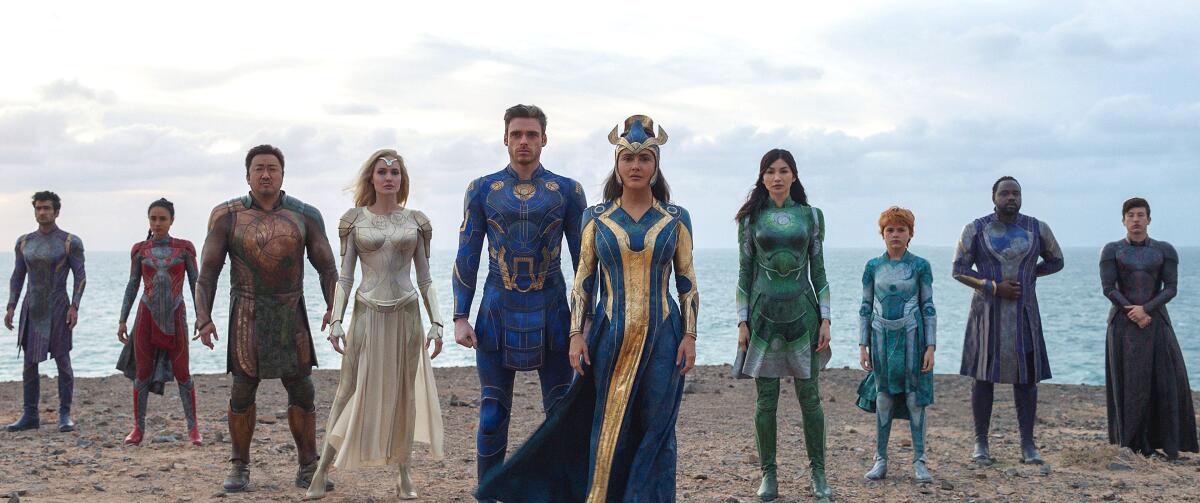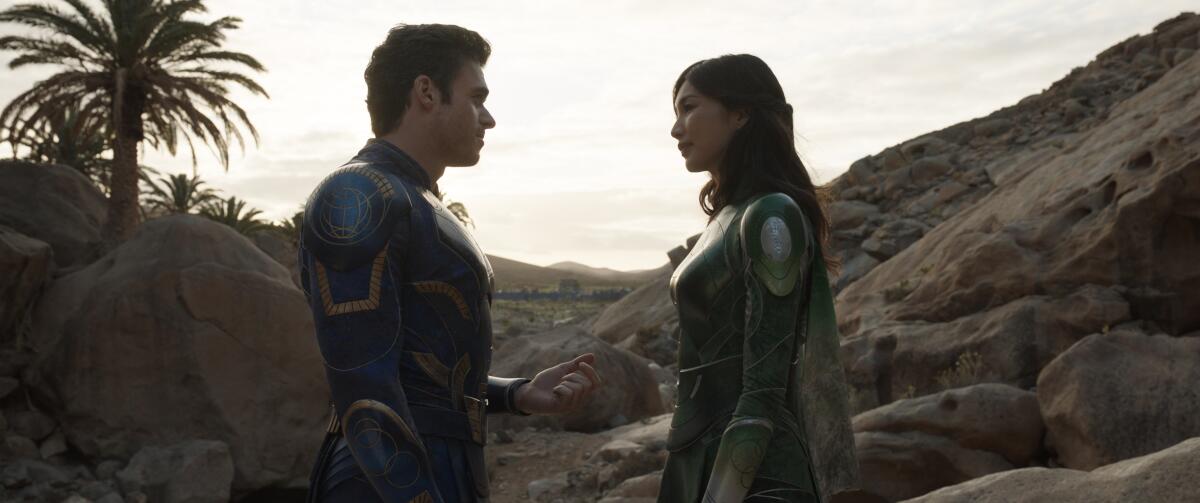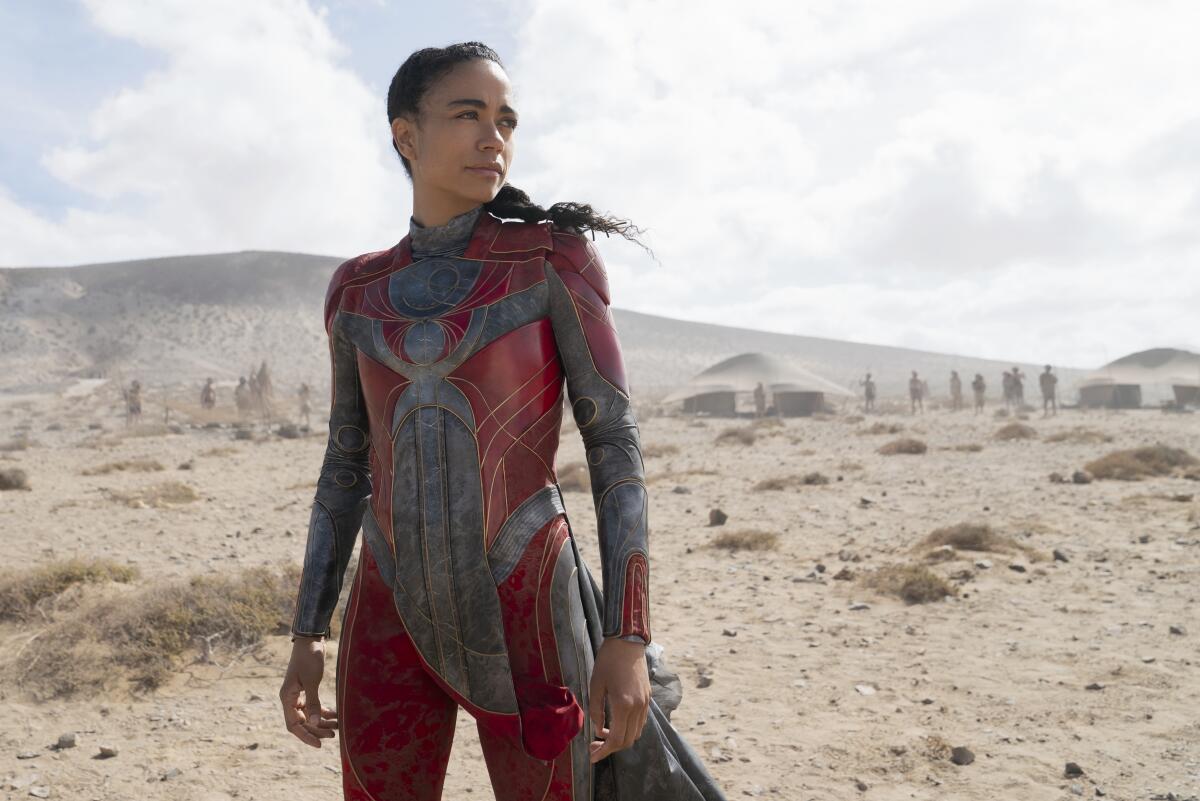Review: In Marvel’s epic ‘Eternals,’ a cosmic breath of fresh air ultimately turns stale

- Share via
The Times is committed to reviewing theatrical film releases during the COVID-19 pandemic. Because moviegoing carries risks during this time, we remind readers to follow health and safety guidelines as outlined by the Centers for Disease Control and Prevention and local health officials.
I don’t know if this constitutes a spoiler, but it might just count as news: The latest Marvel movie, “Eternals,” actually features a sex scene. It’s pretty short (the scene, not the movie) and not particularly steamy, which has less to do with the chemistry of the participants than the chilly-looking riverbank they’ve chosen for the occasion. We’re in Babylon circa 575 B.C., and Ikaris (Richard Madden) and Sersi (Gemma Chan), immortal beings known as Eternals, are expressing their love not just for each other but also for the planet they will spend the next several thousand years trying to protect. Happily, director Chloé Zhao seems to have resisted the temptation to film them writhing on a beach, perhaps aware that she isn’t making “From Here to Eternals.”
To be sure, one PG-13-rated snippet of superhero hanky-panky probably isn’t going to undo the terminal chastity of the Marvel enterprise, which has spent almost 30 films largely squandering the erotic appeal of skin-hugging suits and supernaturally toned abs. But that discussion will have to wait for another day. The point is that, in a couple of key and already loudly advertised respects, “Eternals” isn’t entirely Marvel business as usual. That’s hardly the worst news for those of us who bring a reflexive skepticism to each of this franchise’s offerings, whether good (“Shang-Chi and the Legend of the Ten Rings”), bad (“Black Widow”) or, in this movie’s case, somewhere wackily in-between.
The Avengers are briefly mentioned and never seen. There are no crash courses in tesseract physics or Asgardian politics. Instead there are crystalline images (shot by Ben Davis) of sandy beaches, surreal rock formations and active volcanoes, set against music (composed by Ramin Djawadi) that’s less Alan Silvestri than “Koyaanisqatsi”-era Philip Glass. The action jumps between centuries and sometimes millennia for reasons that have nothing to do with the quantum realm. As present-day scenes blur into prehistoric flashbacks and the running time swells past two hours, our heroes find themselves in the grip of an existential mystery: What are we doing here? Why did our maker put us here, and why has he fallen silent for so long?

To these alternately ravished and glazed-over eyes, then, “Eternals” plays like an extravagant blockbuster riff on “The Tree of Life” — a connection that would feel deliberate even if a giant tree didn’t spring forth in one of the movie’s lovelier CGI epiphanies. Like more than a few filmmakers, Zhao has long counted Terrence Malick an influence; like relatively few filmmakers, she has managed to channel that inspiration in ways that feel more than merely imitative. There’s little of Malick’s whispery cosmic lyricism in her trilogy of rough-hewn independent features — “Songs My Brothers Taught Me,” “The Rider” and last year’s Oscar-winning “Nomadland” — but there is a vision of nature both humble and exalted, as well as a fascination with human lives in all their quotidian glory.
Some of that fascination lingers in “Eternals,” if not nearly enough. There are a few charming glimpses of superhero domesticity, one of which, featuring Brian Tyree Henry and Haaz Sleiman, is sweet enough to feel like more than the sum of the “Marvel’s first gay kiss” headlines it’s bound to generate. Ajak (Salma Hayek), the Eternals’ wise, cryptic leader, is shown making her home on the South Dakota plains, which reinforces Zhao’s auteur signature and makes a nicely muted visual contrast with the more colorful, plotty scenes in contemporary London and ancient Mesopotamia.
That last spot marks the official beginning of the story, laid out in a convulsively time-shuffling script adapted (by Zhao, Patrick Burleigh, Ryan Firpo and Kaz Firpo) from Jack Kirby’s original comic books. In 5,000 B.C., the Eternals first descend to Earth from a gleaming rectangular spaceship that looks a bit like the “2001” obelisk and a bit like something out of a Formica catalog. Armed with names derived from various mythologies — there’s a Thena (Angelina Jolie), but also a Gilgamesh (Don Lee) — and beautifully filigreed CG weapons, these 10 fighters have been sent here by their all-powerful creators, the Celestials, to protect humanity from a race of resilient, ribbony, vaguely chimera-like monsters called Deviants.
Cut to the present day, when we learn that the Eternals have been scattered to the winds, until a renewed threat from the rapidly evolving Deviants (which I kept thinking of as the Variants) forces them to reunite. Extended flashbacks fill in the various personal fallouts and professional disappointments that transpired during the 7,000 years in between. From the beginning, the Celestials instruct the Eternals to blend in with their surroundings — an easier task for the impish shapeshifter Sprite (Lia McHugh) than for, say, someone played by Angelina Jolie — and to use their superpowers only when Deviants are involved. As the centuries pass, those restrictions become frustrating for a tech genius like Phastos (Henry), who laments humanity’s growing facility with weapons, or a gifted telepath like Druig (a terrifically dry Barry Keoghan), who could single-mindedly stop all wars and genocides but is forbidden to do so.

This strict non-interventionist policy, handed down from on high with little explanation, frustrates their do-gooder impulses — Why can’t they do their job and save humanity? — even as it nudges them toward the harder question of whether humanity is actually worth saving. The evidence would suggest the answer is no, as we can see from the fall of Tenochtitlan and a tacky flashback to the smoky ruins of Hiroshima. Like a softer-edged, brighter-colored version of last year’s “The Old Guard,” “Eternals” tracks a group of ageless fighters forced to bear the toll of endless, pointless atrocities.
Our propensity for violence and chaos is of course part of what makes us human. But so is our capacity for wit, grace and beauty, some of which is on display in an amusing Bollywood-style production number starring Kingo (Kumail Nanjiani), the Eternals’ designated musical-comedy relief, and also in the warm romantic byplay between Sersi and her hunky post-Ikaris mortal squeeze (Kit Harington). The question of free will comes to a head when the Eternals catch up with Druig, who now oversees a community of peaceful, blissfully mind-controlled humans living deep in the South American jungle. (Even those who griped that Zhao made Amazon look good in “Nomadland” might be unprepared for how good she makes the Amazon look here.)
All this philosophical hand-wringing, presented with the expected complement of wisecracking banter, gives “Eternals” an initially pleasurable mix of goofiness and gravity. It would be nice to report that this fusion made Zhao’s movie a surreally trippy outlier in the Marvel cosmos, a picture that succeeded in liberating itself from the creative shackles of our most ubiquitous big-screen (and small-screen) franchise. The longer it goes on, however, and the more it explains itself, the less these free-will-obsessed characters seem to evince any agency of their own. They’re trapped in what increasingly plays like an off-brand, off-its-game “Avengers” movie, in which various attention-grabbing firsts — whether it’s the speedy Makkari (Lauren Ridloff) becoming Marvel’s first Deaf superhero or Chan’s Sersi serving as Marvel’s first Asian female headliner — haven’t been sufficiently developed as characters beyond their representational precedents.
‘Eternals’ boasts the most diverse cast in Marvel history — including Lauren Ridloff, a Deaf actor who plays the franchise’s first Deaf superhero.
The Eternals’ onscreen struggle, pitting them against the whims of a grimly authoritarian overlord, too precisely mirrors their relationship to the Disney/Marvel corporate apparatus that created them and that will exploit them until their potential is exhausted. What initially seemed fresh and invigorating devolves into something you’ve seen countless times before: The fate of the world hinges on an epic burst of teamwork, as well as one character’s perfunctory realization of long-suppressed potential. Longtime friends betray and forgive each other, and eyes and hands shoot bolts of gilded lightning. A rush of end-credits cliffhangers elicits gasps from the audience, and the final title card — “Eternals will return” — starts to sound less like a promise than a threat. You walk out in the depressing realization that you’ve just seen one of the more interesting movies Marvel will ever make, and hopefully the least interesting one Chloé Zhao will ever make.
‘Eternals’
Rating: PG-13, for fantasy violence and action, some language and brief sexuality
Running time: 2 hours, 37 minutes
Playing: Starts Nov. 5 in general release
More to Read
Only good movies
Get the Indie Focus newsletter, Mark Olsen's weekly guide to the world of cinema.
You may occasionally receive promotional content from the Los Angeles Times.










